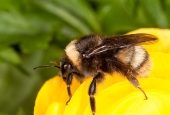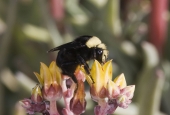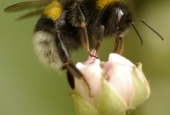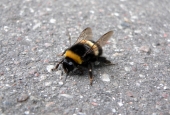Bumble bees are black and yellow, fuzzy, hairy insects, about ¾ to one inch long. They are different than carpenter bees, which are about the same size but are black, shiny and hairless. Bumble bees have a barbless stinger and can sting more than once but only sting if aggravated.
Bumble bees are social insects that live in nests or colonies. Compared to honey bees or yellow jackets, the bumble bee is less aggressive. They rarely sting but will do so if their nest is threatened or disturbed. Each nest contains anywhere from 50-400 bees. They usually build their nest in ground cavities (often abandoned rodent tunnels), but some can be located in wood piles, walls, sheds, crawl spaces or even abandoned birds’ nests.
The bumble bee is an important plant pollinator and considered a beneficial insect. The adult workers are sterile females and normally appear in late summer. Usually only queens survive the winter, underground, in a protected location. In the early spring she selects a suitable nesting site, lays eggs and begins a new colony. Bumble bees produce small amounts of a honey-like substance to feed the young.
Control includes preventive measures as well as the use of insecticides. Proactive control measures include sealing openings (cracks, holes and gaps) in structures to deny bumble bees access. Occasionally, a new queen will use an old nest site to start a new nest. Closing the opening to an old nest can prevent reuse.
Outdoor activities often bring humans into conflict with a nest. Unfortunately, there may be times when it is necessary to use lethal means to control bumble bees. As a health concern, some individuals have a severe allergic reaction to a sting. Along with honey bees, the insects are usually only destroyed if necessary for human safety. Both bees make large environmental contributions as pollinators.
Please contact the Vector Control Service District and consult with one of our Biologists before deciding to destroy a bumble bee nest. PLEASE NOTE: Insects inside buildings (walls, attics or foundations) are not serviced by the District and you are advised to call a professional pest management company.






